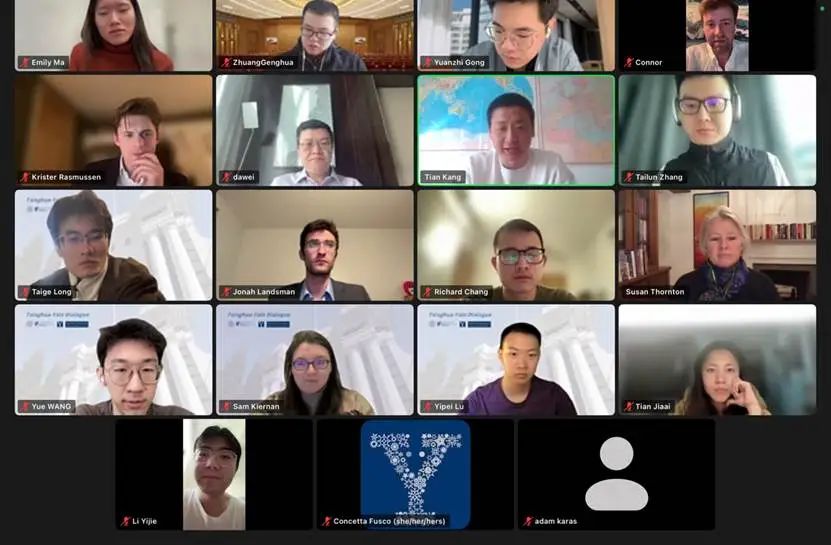At 8:00 a.m. Beijing time on March 29, the second plenary session of the 2025 “Tsinghua-Yale Youth Dialogue” series, co-hosted by the Center for International Security and Strategy (CISS) at Tsinghua University and the Paul Tsai China Center at Yale Law School, was officially held. This marks the third time that CISS and the Yale China Center have jointly organized the “Tsinghua-Yale Dialogue” series.


This year’s dialogue was held primarily online and brought together 15 young students each from the Department of International Relations at Tsinghua University and Yale Law School. The program aims to foster intellectual and academic exchange among young Chinese and American students and help them gain deeper insights into the dynamics of China-U.S. relations.
Professor Da Wei, Director of CISS; Professor Paul Gewirtz, Director of the Paul Tsai China Center at Yale; and Ms. Susan Thornton, Senior Fellow at the Center and former Acting Assistant Secretary of State for East Asian and Pacific Affairs, attended the meeting.
Following the conclusion of the first session, the 30 youth representatives—15 from each side—were divided equally into three working groups to engage in in-depth discussions on three core topics: “Security and Military Affairs,” “Bilateral Economic and Technological Issues,” and “Global Governance and International Order.” Over the past month, each group independently organized multiple discussions and jointly formulated a statement outlining mutual understandings, core principles, and proposed future actions.
At the second plenary session, each group designated one Chinese and one American representative to present the joint statement, and then responded to questions from the wider group of youth participants and the three attending experts.
The “Security and Military Affairs” group summarized the initial areas of consensus and disagreement between China and the U.S., focusing on improving communication and mutual trust, non-proliferation and arms control, and approaches to the Taiwan issue.
The “Bilateral Economic and Technological Issues” group presented cooperation proposals in areas such as tariffs and investment, export controls and sanctions, and emerging technologies—especially artificial intelligence. The group emphasized resolving trade frictions and promoting mutually beneficial economic cooperation through mechanisms like incentive-based frameworks, enhanced collaboration, and joint development funds.
The “Global Governance and International Order” group outlined collaborative opportunities in climate change, fentanyl trafficking, and foreign aid. Their report underscored the need for both countries to transcend geopolitical competition and focus on global challenges such as climate action, public health, and poverty alleviation. Concrete suggestions were made, including enhancing climate cooperation, jointly combating fentanyl smuggling, and launching collaborative foreign aid projects to contribute to global stability and sustainable development.
This series aims to provide a platform for practical diplomacy, encouraging young scholars from Tsinghua and Yale to engage in dialogue on key issues and priorities in China-U.S. relations over the next four years. Participants offer recommendations from their respective perspectives to support a healthier and more constructive bilateral relationship. At the same time, the program fosters greater understanding and closer connections between students from the two universities.
The Tsinghua-Yale Strategic Youth Dialogue is a collaborative initiative jointly organized by the Center for International Security and Strategy (CISS) andCenter for Global Competence Development at Tsinghua University, the Paul Tsai China Center at Yale Law School, and the Yale Center Beijing. The series is designed to offer a platform for exchange between youth from both countries, enhance mutual understanding, and encourage young people to think deeply and critically in dialogue, strengthening their global and strategic awareness.
